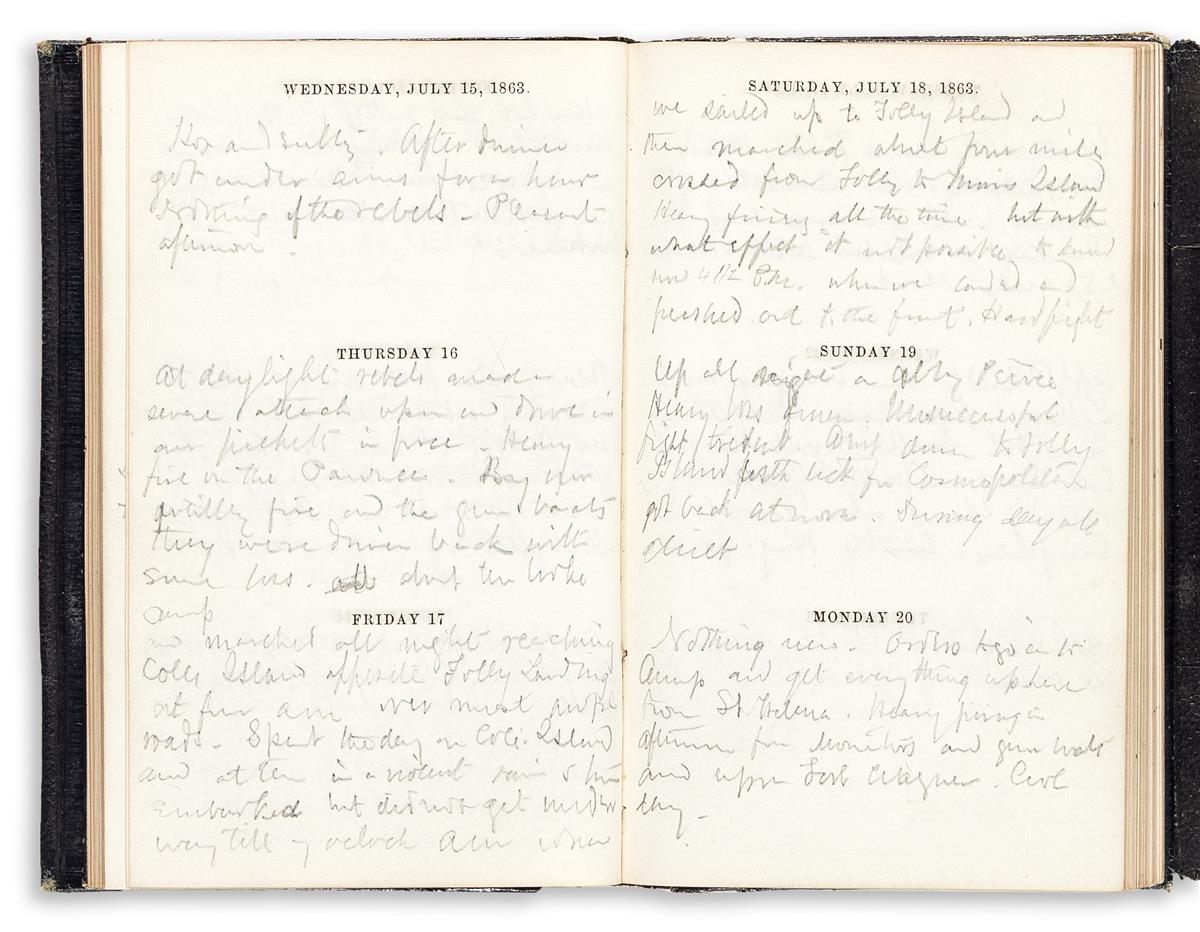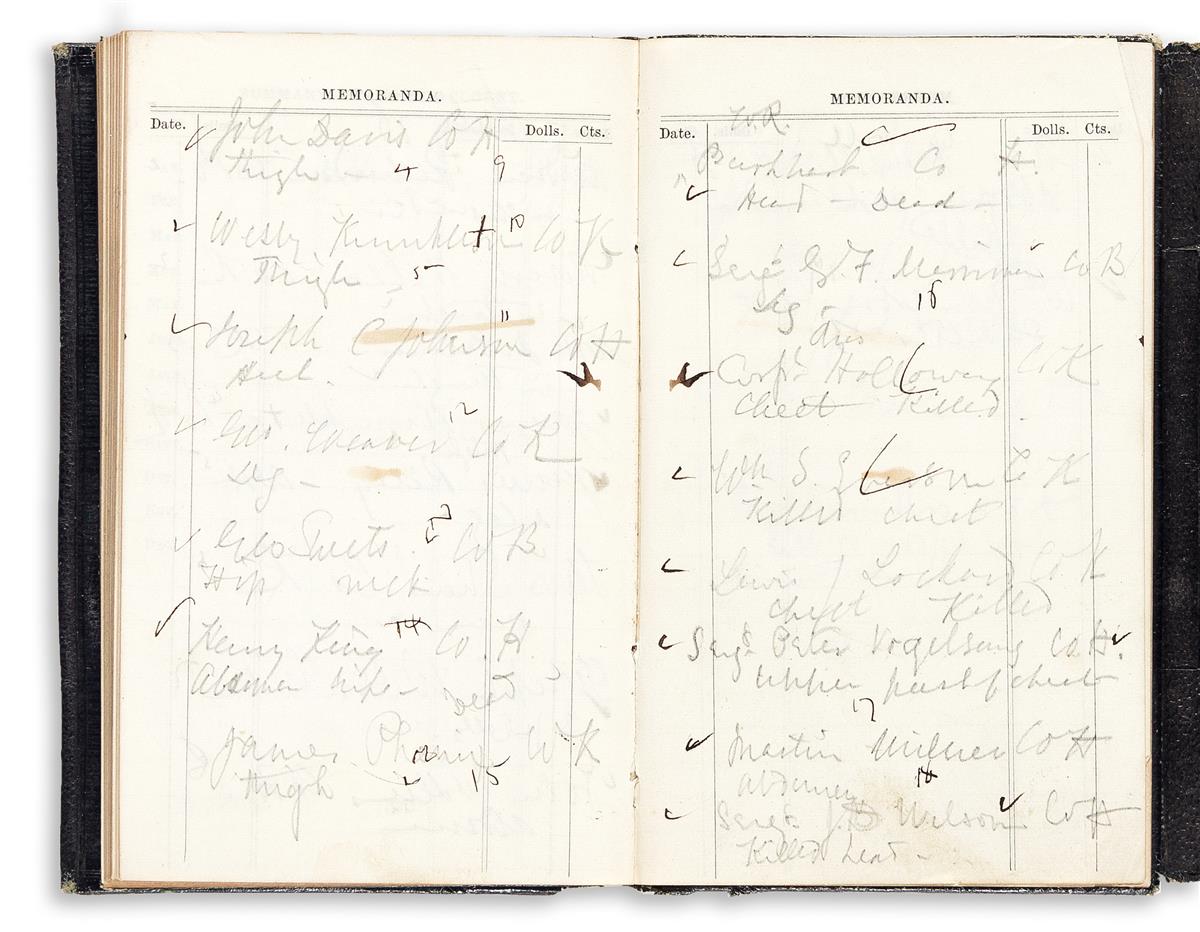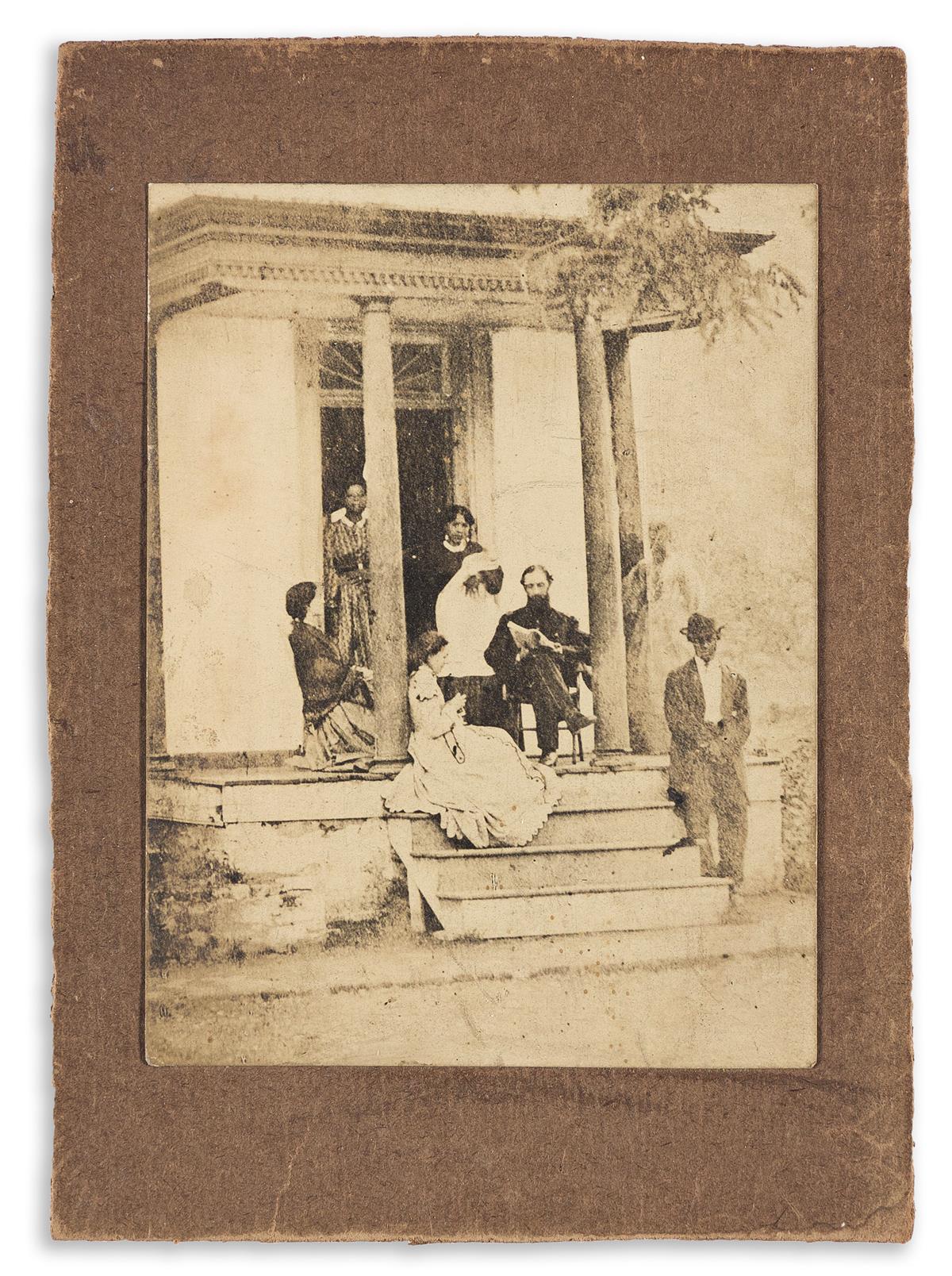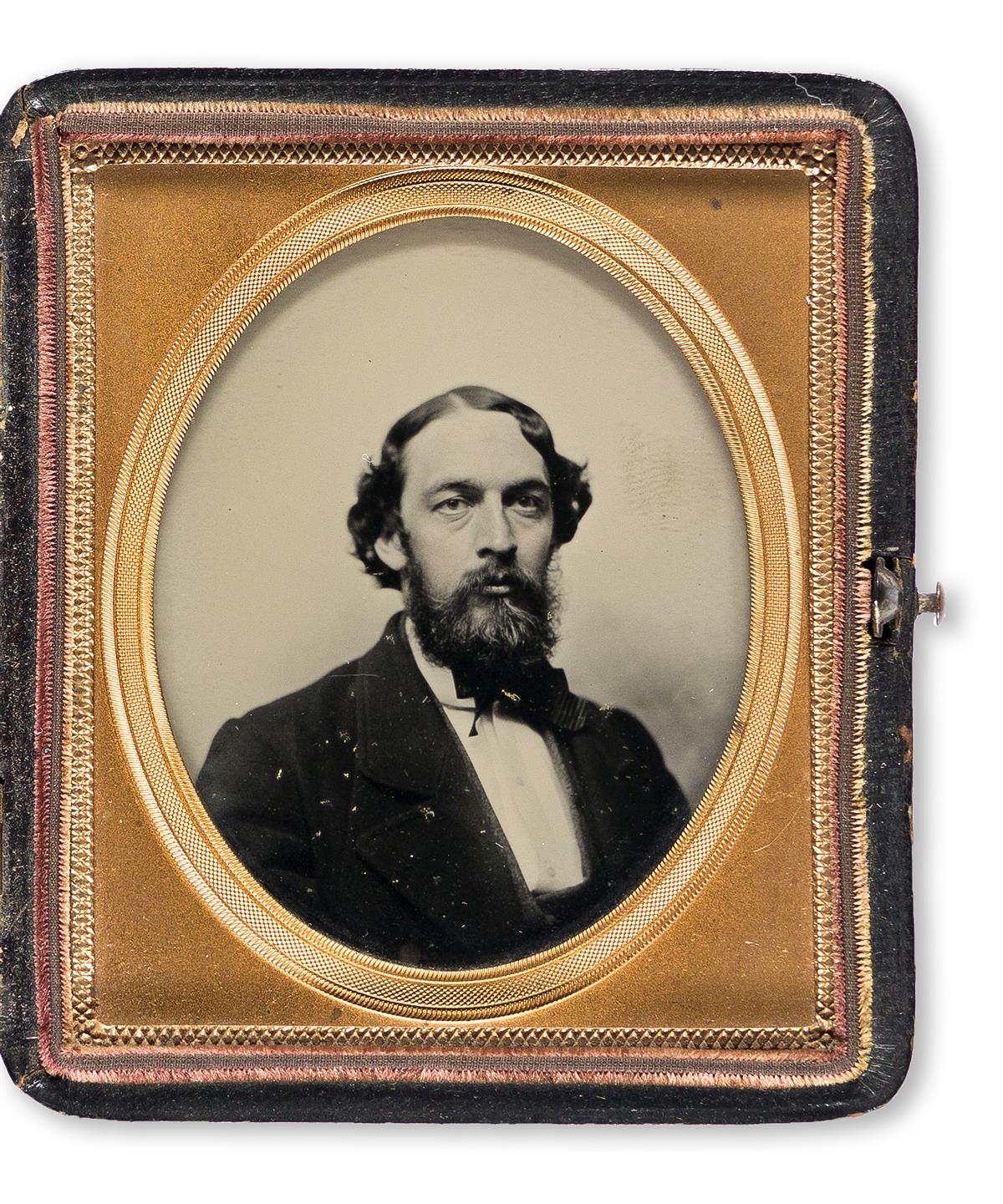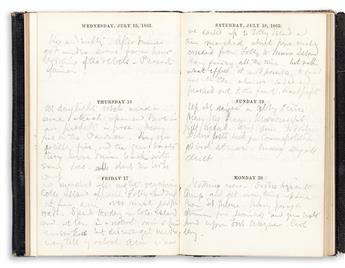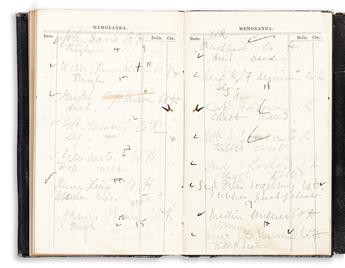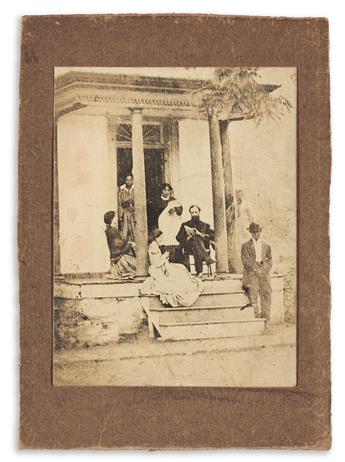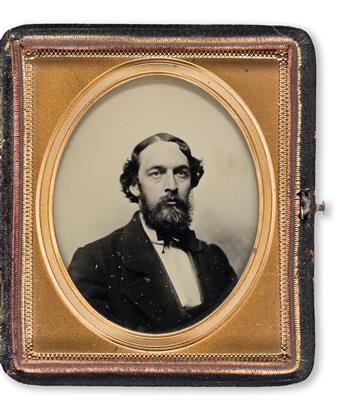Sale 2631 - Lot 243
Price Realized: $ 40,000
Price Realized: $ 50,000
?Final Price Realized includes Buyer’s Premium added to Hammer Price
Estimate: $ 20,000 - $ 30,000
(MILITARY--CIVIL WAR.) Lincoln Ripley Stone. Diary of the surgeon from the famed 54th Massachusetts Infantry, and related photos. [56] manuscript diary pages plus [30] pages of memoranda. 16mo, 4 3/4 x 3 inches, original calf, minor wear; minimal wear to contents; signed on front flyleaf. Various places, 28 May to 25 December 1863
Additional Details
"Col. Shaw certainly dead, buried in the trenches covered by his men."
The 54th Massachusetts Infantry remains perhaps the most famous regiment in the Civil War, thanks in part to the 1989 film Glory. Organized by prominent Boston abolitionists, its enlisted men were free Black soldiers recruited from across the northeast--the first such regiment in the Union army. This diary was written by the regiment's white surgeon Lincoln Ripley Stone, starting with the regiment's departure from Boston, through its tragic losses at the battle of Fort Wagner and beyond. It discusses the death of the regiment's commander Robert Gould Shaw, and includes notes on thirty of the wounded soldiers treated by Dr. Stone.
The diary begins with Stone traveling south with the regiment, arriving near besieged Charleston, South Carolina, seeing Fort Sumter, and on 9 June going ashore with Colonel Shaw. The regiment's first action was a controversial expedition with the 2nd South Carolina Volunteers to loot and burn Darien, GA: "We got asked to join on an expedition with Col. Montgomery. Sailed at six, stopped at the camp . . . then sailed for Doboy Sound. . . . Did not get off till midnight, sailed along slowly past Darien, approached it about noon. Landed and burnt and pillaged the town, then came back, spent the night on board at mouth of river" (10-11 June). The next day Dr. Stone's entry reflected the regiment's general feeling about this unsavory assignment: "Got back to camp tired and disgusted about two o'clock. Ashamed of yesterday's work."
On 12 July, Stone noted: "Man shot himself accidentally with a pistol." The man's name, Abraham Brown of Company E, is inscribed on the inside front cover.
The regiment's first battle was on 16 July, the Battle of James Island or Grimball's Landing: "At daylight Rebels made severe attack upon us, drove in our pickets in force. Heavy fire in the Pawnee. By our artillery fire and the gun boats, they were driven back with some loss. We broke camp and marched all night, reaching Coles Island opposite of Folly Landing at four a.m."
Two days later, on 18 July 1863, Dr. Stone described the famous Battle of Fort Wagner, where the 54th gained its fame: "We sailed up to Folly Island, and then marched about four miles, crossed from Folly to Morris Island. Heavy firing all the time, but with what effect is not possible to know. Was 4 1/2 p.m. when we pushed out to the front. Hard fight." The surgeon was understandably busy into the following day: "Up all night. . . . Heavy loss from unsuccessful fight."
The fate of the regiment's commander Col. Robert Gould Shaw was not known with certainty on the day of the battle. Three days later: "Wrote to Col. Shaw's father that Bob probably killed, also to Mr. James. Very very sad." The next day, he added "Col. Shaw undoubtedly certainly killed & fear also Russel & Simpkins. Terrible thing for us." The final news of Shaw's fate arrived on 24 July, 6 days after the battle: "Flag of truce in the morning. Col. Shaw certainly dead, buried in the trenches covered by his men."
In the cash account section at the rear of the diary is an entry on 5 October, while Dr. Stone was on leave: "To Mr. Shaw, old account of Col. Shaw. $250." At the rear of the volume is a 5-page list of soldiers in the 54th who were treated for injuries in July. 30 soldiers are named, with their company, and where they were injured: "Andrew Richardson, Co B, shoulder; Robert Nelson, Co K, thigh; Corp'l J. Palmer, Co K, in thigh," etc. Official rolls show that most of them were wounded at the Battle of James Island on 16 July, the date which appears at the head of two pages. One entry describes "Burkhart, Co A, head, dead"--Private Henry F. Burghardt is recorded as killed at the Battle of Fort Wagner. Six others are listed as killed or dead at James Island.
The diarist Lincoln Ripley Stone (1832-1930) of Salem, MA graduated from Harvard in 1854, and enlisted early in the war as an assistant surgeon. In May 1863, he joined the 54th Massachusetts as their surgeon. After noting the fate of Col. Shaw, he recorded only a few more entries with the regiment before leaving them on 23 September. He transferred to the army's Medical Department, and remained with the army through the end of the war. After the war, he settled in Newton, MA.
With--four photographs: an early copy-print photograph, 4 x 3 inches on plain mount, which apparently shows Dr. Stone on a porch with servants, possibly in South Carolina; a cased sixth-plate ambrotype portrait of Dr. Stone with minor wear to the backing; an uncased ninth-plate daguerreotype portrait of his brother George Herbert Stone (1840-1863), who died in Louisiana while serving with another regiment; and a cased quarter-plate tintype photograph of their father, the Rev. Thomas Treadwell Stone (1801-1895).
Additional abstracts from the diary are available by request.
The 54th Massachusetts Infantry remains perhaps the most famous regiment in the Civil War, thanks in part to the 1989 film Glory. Organized by prominent Boston abolitionists, its enlisted men were free Black soldiers recruited from across the northeast--the first such regiment in the Union army. This diary was written by the regiment's white surgeon Lincoln Ripley Stone, starting with the regiment's departure from Boston, through its tragic losses at the battle of Fort Wagner and beyond. It discusses the death of the regiment's commander Robert Gould Shaw, and includes notes on thirty of the wounded soldiers treated by Dr. Stone.
The diary begins with Stone traveling south with the regiment, arriving near besieged Charleston, South Carolina, seeing Fort Sumter, and on 9 June going ashore with Colonel Shaw. The regiment's first action was a controversial expedition with the 2nd South Carolina Volunteers to loot and burn Darien, GA: "We got asked to join on an expedition with Col. Montgomery. Sailed at six, stopped at the camp . . . then sailed for Doboy Sound. . . . Did not get off till midnight, sailed along slowly past Darien, approached it about noon. Landed and burnt and pillaged the town, then came back, spent the night on board at mouth of river" (10-11 June). The next day Dr. Stone's entry reflected the regiment's general feeling about this unsavory assignment: "Got back to camp tired and disgusted about two o'clock. Ashamed of yesterday's work."
On 12 July, Stone noted: "Man shot himself accidentally with a pistol." The man's name, Abraham Brown of Company E, is inscribed on the inside front cover.
The regiment's first battle was on 16 July, the Battle of James Island or Grimball's Landing: "At daylight Rebels made severe attack upon us, drove in our pickets in force. Heavy fire in the Pawnee. By our artillery fire and the gun boats, they were driven back with some loss. We broke camp and marched all night, reaching Coles Island opposite of Folly Landing at four a.m."
Two days later, on 18 July 1863, Dr. Stone described the famous Battle of Fort Wagner, where the 54th gained its fame: "We sailed up to Folly Island, and then marched about four miles, crossed from Folly to Morris Island. Heavy firing all the time, but with what effect is not possible to know. Was 4 1/2 p.m. when we pushed out to the front. Hard fight." The surgeon was understandably busy into the following day: "Up all night. . . . Heavy loss from unsuccessful fight."
The fate of the regiment's commander Col. Robert Gould Shaw was not known with certainty on the day of the battle. Three days later: "Wrote to Col. Shaw's father that Bob probably killed, also to Mr. James. Very very sad." The next day, he added "Col. Shaw undoubtedly certainly killed & fear also Russel & Simpkins. Terrible thing for us." The final news of Shaw's fate arrived on 24 July, 6 days after the battle: "Flag of truce in the morning. Col. Shaw certainly dead, buried in the trenches covered by his men."
In the cash account section at the rear of the diary is an entry on 5 October, while Dr. Stone was on leave: "To Mr. Shaw, old account of Col. Shaw. $250." At the rear of the volume is a 5-page list of soldiers in the 54th who were treated for injuries in July. 30 soldiers are named, with their company, and where they were injured: "Andrew Richardson, Co B, shoulder; Robert Nelson, Co K, thigh; Corp'l J. Palmer, Co K, in thigh," etc. Official rolls show that most of them were wounded at the Battle of James Island on 16 July, the date which appears at the head of two pages. One entry describes "Burkhart, Co A, head, dead"--Private Henry F. Burghardt is recorded as killed at the Battle of Fort Wagner. Six others are listed as killed or dead at James Island.
The diarist Lincoln Ripley Stone (1832-1930) of Salem, MA graduated from Harvard in 1854, and enlisted early in the war as an assistant surgeon. In May 1863, he joined the 54th Massachusetts as their surgeon. After noting the fate of Col. Shaw, he recorded only a few more entries with the regiment before leaving them on 23 September. He transferred to the army's Medical Department, and remained with the army through the end of the war. After the war, he settled in Newton, MA.
With--four photographs: an early copy-print photograph, 4 x 3 inches on plain mount, which apparently shows Dr. Stone on a porch with servants, possibly in South Carolina; a cased sixth-plate ambrotype portrait of Dr. Stone with minor wear to the backing; an uncased ninth-plate daguerreotype portrait of his brother George Herbert Stone (1840-1863), who died in Louisiana while serving with another regiment; and a cased quarter-plate tintype photograph of their father, the Rev. Thomas Treadwell Stone (1801-1895).
Additional abstracts from the diary are available by request.
Exhibition Hours
Exhibition Hours
Aliquam vulputate ornare congue. Vestibulum maximus, libero in placerat faucibus, risus nisl molestie massa, ut maximus metus lectus vel lorem.



